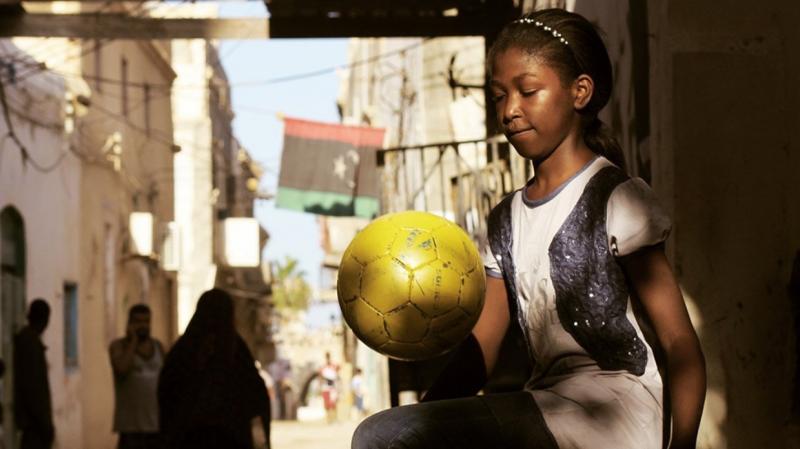Freedom Fields review - Libya’s next freedom fighters | reviews, news & interviews
Freedom Fields review - Libya’s next freedom fighters
Freedom Fields review - Libya’s next freedom fighters
Insightful documentary shows how women use football to break boundaries

Set in the months and years after the Libyan revolution, Freedom Fields follows several women aiming to compete in international football. The documentary finds the players excitedly preparing for their first overseas tournament.
It’s clear that British-Libyan filmmaker Naziha Arebi originally planned to follow the women to the tournament, an uplifting tale of competition and sisterhood. Instead, we catch up a year later to find a much more complicated situation. With the group all but disbanded, the players have given up their dreams: some have accepted marriage, others bury their head in studies. It’s not until one last opportunity arises that those old fires are relit.
Freedom Fields is often a fascinating watch. With a constant threat of retribution, the women must practice at night while bombs and gunfire ring out across the city. Even when a blackout cuts the floodlights, cars are lined up to light the pitch. Their determination is unbreakable, even paying for their own travel to compete as a private team.
The film’s most affecting moments come when the women confront their situation
However, it can be difficult to follow what’s happening at times. The fly-on-the-wall style means that many situations lack context, with the viewer left to keep up with conversations and guess their lead up. It also feels like half of the story is left off camera. The middle section gives a rare look into life in Libya, but occasionally treads water, while the five year catch up at the end shows how much we missed. This is no doubt due to when the crew could be present, and does not detract from the overall story.
The film’s most affecting moments come when the women confront their situation. In one outburst, one player explains how the revolution promised freedom, but life for women has not improved – if anything, religion has made it stricter. It’s a subtle film, but it offers an unparalleled insight into life after the Arab Spring, featuring some truly powerful women.
rating
Explore topics
Share this article
The future of Arts Journalism
You can stop theartsdesk.com closing!
We urgently need financing to survive. Our fundraising drive has thus far raised £49,000 but we need to reach £100,000 or we will be forced to close. Please contribute here: https://gofund.me/c3f6033d
And if you can forward this information to anyone who might assist, we’d be grateful.

Subscribe to theartsdesk.com
Thank you for continuing to read our work on theartsdesk.com. For unlimited access to every article in its entirety, including our archive of more than 15,000 pieces, we're asking for £5 per month or £40 per year. We feel it's a very good deal, and hope you do too.
To take a subscription now simply click here.
And if you're looking for that extra gift for a friend or family member, why not treat them to a theartsdesk.com gift subscription?
more Film
 Can I get a Witness? review - time to die before you get old
Ann Marie Fleming directs Sandra Oh in dystopian fantasy that fails to ignite
Can I get a Witness? review - time to die before you get old
Ann Marie Fleming directs Sandra Oh in dystopian fantasy that fails to ignite
 Happyend review - the kids are never alright
In this futuristic blackboard jungle everything is a bit too manicured
Happyend review - the kids are never alright
In this futuristic blackboard jungle everything is a bit too manicured
 Robert Redford (1936-2025)
The star was more admired within the screen trade than by the critics
Robert Redford (1936-2025)
The star was more admired within the screen trade than by the critics
 Blu-ray: The Sons of Great Bear
DEFA's first 'Red Western': a revisionist take on colonial expansion
Blu-ray: The Sons of Great Bear
DEFA's first 'Red Western': a revisionist take on colonial expansion
 Spinal Tap II: The End Continues review - comedy rock band fails to revive past glories
Belated satirical sequel runs out of gas
Spinal Tap II: The End Continues review - comedy rock band fails to revive past glories
Belated satirical sequel runs out of gas
 Downton Abbey: The Grand Finale review - an attemptedly elegiac final chapter haunted by its past
Noel Coward is a welcome visitor to the insular world of the hit series
Downton Abbey: The Grand Finale review - an attemptedly elegiac final chapter haunted by its past
Noel Coward is a welcome visitor to the insular world of the hit series
 Islands review - sunshine noir serves an ace
Sam Riley is the holiday resort tennis pro in over his head
Islands review - sunshine noir serves an ace
Sam Riley is the holiday resort tennis pro in over his head
 theartsdesk Q&A: actor Sam Riley on playing a washed-up loner in the thriller 'Islands'
The actor discusses his love of self-destructive characters and the problem with fame
theartsdesk Q&A: actor Sam Riley on playing a washed-up loner in the thriller 'Islands'
The actor discusses his love of self-destructive characters and the problem with fame
 Honey Don’t! review - film noir in the bright sun
A Coen brother with a blood-simple gumshoe caper
Honey Don’t! review - film noir in the bright sun
A Coen brother with a blood-simple gumshoe caper
 The Courageous review - Ophélia Kolb excels as a single mother on the edge
Jasmin Gordon's directorial debut features strong performances but leaves too much unexplained
The Courageous review - Ophélia Kolb excels as a single mother on the edge
Jasmin Gordon's directorial debut features strong performances but leaves too much unexplained
 Blu-ray: The Graduate
Post #MeToo, can Mike Nichols' second feature still lay claim to Classic Film status?
Blu-ray: The Graduate
Post #MeToo, can Mike Nichols' second feature still lay claim to Classic Film status?

Add comment